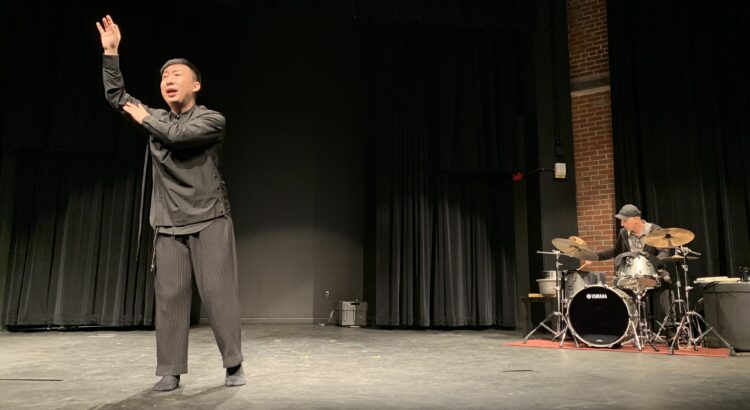As part of the U-M Fall 2023 Festival of Asian Music, Terry Tsang and Jay Peng Zhang came to the Keene Theater in East Quad on Tuesday, October 24.
Terry Tsang is a choreographer primarily working in Hong Kong. I was expecting him to perform, but instead, he gave a presentation because his work centers around exploring the human body through nudity and human desires, a concept that was inspired by simply walking down the street. Tsang wanted to know if we could truly understand someone through their body alone and if the body speaks the truth, as verbal communication leaves room for dishonesty. He showed us a couple of videos of his choreographies that expressed his interpretation of what love means, incorporating the gestures of making love that gradually transformed into an animalistic representation of sex since animals are designed to survive through reproduction. The dancers were completely nude but wore strange and purposefully unsettling masks that completely hid their faces; in fact, during the Q&A session at the end, an audience member described the dancing as creepy.
Jay Peng Zhang on the other hand did give a live performance and sang the folk songs of various ethnic groups in China, such as the Tujia ethnic group from the Western Hunan Province. His singing was accompanied by only one person, who played a drum set muted by cloth and other percussive items, like large pots; but rather than an accompaniment, the percussion sounded like a response to his singing and movements because of its continuous resonance instead of emphasized beats. Zhang sang with a powerful voice, and his breath control and crescendoes were incredible; however, he moved his fingers very daintily, creating a beautiful and interesting contrast.
Zhang explained how he didn’t want to give the audience a flashy performance but rather a meaningful and interactive experience to renew and rebuild old rituals, as over time they’ve lost their meaning “like artifacts in a museum,” performed only as a tourist attraction. To him, folk songs and their intended rituals don’t signify religion, but instead are a way to release stress and help keep our hearts peaceful and balanced.
The most memorable song Zhang sang was one traditionally sung by women left behind at home by their lovers who left to earn money. The girls would sing the song to a river because they believed the water would carry their emotions to another place, and when their lover saw the water, he could feel her love. Zhang asked the audience to accompany his singing by collectively becoming “a group of water” by enunciating syllables that represented flowing waves. The amazing part is how the audience naturally added dynamics to the space created through Zhang’s gentle dance.




